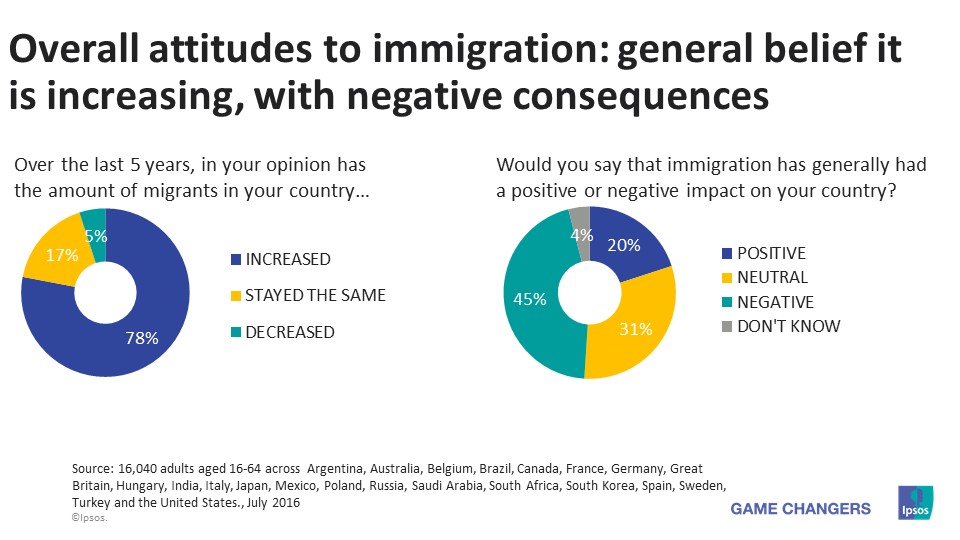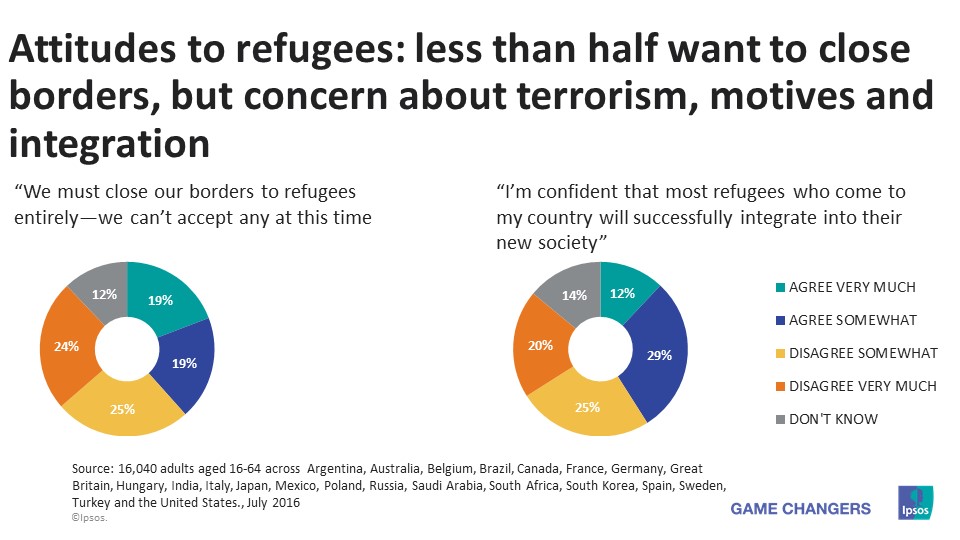Global Study Shows Many Around the World Increasingly Uncomfortable with Levels of Immigration
A major new Ipsos survey across 22 countries worldwide provides an insight into attitudes to immigration and the refugee crisis. The survey, among online adults aged under 65 in Argentina, Australia, Belgium, Brazil, Canada, France, Britain, Germany, Hungary, India, Italy, Japan, Mexico, Poland, Russia, Saudi Arabia, South Africa, South Korea Spain, Sweden, Turkey and the United States finds attitudes to immigration throughout the world are often negative – and a significant minority want to close borders to refugees, with many concerned about terrorists disguising themselves as refugees.
Overall attitudes to immigration tend to be negative
Nearly every country believes immigration has risen over the last five years, and on average half believe there is too much immigration in their country. Negative attitudes are consistently high in Turkey, Italy, Russia, Belgium and Hungary.
- Across all of the countries, on average 78% say immigration to their country has increased over the past five years. Those in Turkey, Sweden, Germany, and South Africa are particularly likely to think immigration has increased (nine in ten or more say it has). The biggest rises in perceptions of increased immigration since the question was asked in 2011 have been in Turkey, Sweden, Germany and France.
- On average, more people say immigration has generally had a negative (45%) rather than positive (20%) effect on their country. Six in ten or more in Turkey, Italy, Russia, Hungary, France and Belgium say immigration has had a negative impact. At the other end of the spectrum, 48% in Saudi Arabia and 45% in India say immigration has had a positive impact on their country.

- Half across the 22 countries say there are too many immigrants in their country (49%), and a similar proportion (46%) say immigration is causing their country to change in ways they don’t like. Concern about both measures is especially high in Turkey, Italy, Russia and Belgium. The Japanese are least likely to say immigration there are too many immigrants in their country (only 12%), and the Brazilians are least likely to say they are uncomfortable with how immigration is changing their country (23%).
- Although in Britain views tend to be more negative than positive, we are actually mid-table on most measures, and there are some more positive views on immigration than in previous years. Thirty-five percent of Britons think that immigration has been good for the country (up from 28% a year ago, and 19% in 2011), while 49% think there are too many immigrants in the UK, down from 60% a year ago and 71% in 2011. These positive changes are despite a significant increase in immigration and the recent EU Referendum, where reducing immigration was a key factor behind the vote for “Brexit”.
People are most concerned about the impact of immigration on public services in their country
In most of the countries surveyed, a majority think immigration has placed too much pressure on public services, and people are split on the economic benefits of immigration. Attitudes tend to be more positive in Saudi Arabia, India, Britain, Canada and Australia, but more negative in Turkey, France, Russia, Hungary and Italy.
- On average half (50%) think that immigration has placed too much pressure on public services in their country, while just 18% disagree. Concern is highest in Turkey (72%, up from 45% in 2011), South Africa (62%), the US and France (both 60%). Since 2011 there has also been a notable rise in concern about pressure on public services in Sweden (up by 15 points to 55%).
- When it comes to the economy, on average 44% think immigration has made it more difficult for home nationals to get jobs (15% disagree), and only 28% think it has been good for their country’s economy (while 28% disagree). People in Saudi Arabia, India, Britain, Canada and Australia say immigration has on balance been good for their economy, but the most negative perceptions are again in Turkey, Hungary, Russia, Italy and France.
- Views are also split on whether priority should be given to higher-skilled immigrants who can fill shortages in particular professions – on average 40% agree with this, but this rises to over half in Britain, South Africa, Saudi Arabia and Australia.
- On other issues, on average three in ten (29%) say that immigration has made their country a more interesting place to live, but this hides big differences – agreement is highest in Australia, Great Britain, Saudi Arabia, Canada, India and the US, but lowest in Russia, Hungary, Japan and Italy.
- Education is a key factor in attitudes to immigration in many of the countries; for example, on average 28% of those who are highly educated say it has a positive impact compared with 16% among those with low/medium education. Those who are more educated are also more likely to think immigration is good for the economy (35% say this compared to 28% on average) and are less likely to say there are too many immigrants in their country (45% compared with 55% for those with less education.)
Four in ten want to close borders to refugees, and six in ten think terrorists are pretending to be refugees
As the refugee crisis continues, the findings also show that a large minority want to close borders entirely – and there are widespread concerns throughout the world about terrorists pretending to be refugees, integration of refugees, and doubts that many seeking refuge are genuine:
- Across all of the countries, four in ten (38%) agree that their country should close its borders to refugees entirely. In most countries the majority want to keep borders open, but majorities are in favour of closing borders in Turkey, India and Hungary, while the biggest increases in favour of closing borders since 2015 have been in Turkey, the US and Sweden.
- On average, six in ten (61%) agree that terrorists are pretending to be refugees, with over seven in ten believing this to be the case in Turkey, Russian, India, Hungary, Germany and the US. The biggest rises since 2011 have been in Russia and Germany
- Majorities in most countries also think that most foreigners coming to their country as refugees are not really refugees, but economic migrants (51% on average, with 81% in Russia thinking most refugees are economic migrants).
- And only 41% are confident that refugees coming to their country will successfully integrate into the country (scepticism is especially high in Turkey, France and Belgium, where at least six in ten lack confidence that integration can be achieved).




